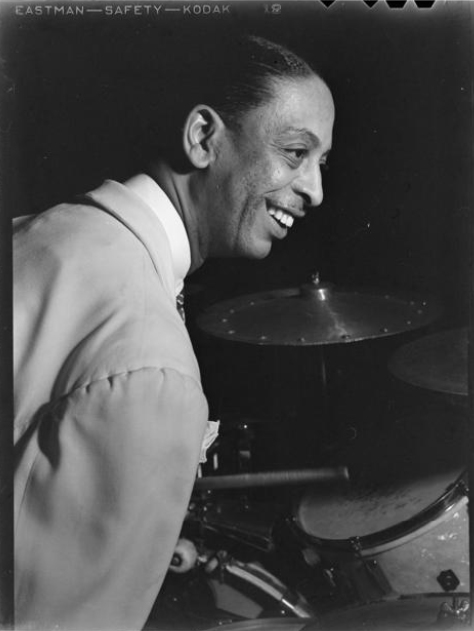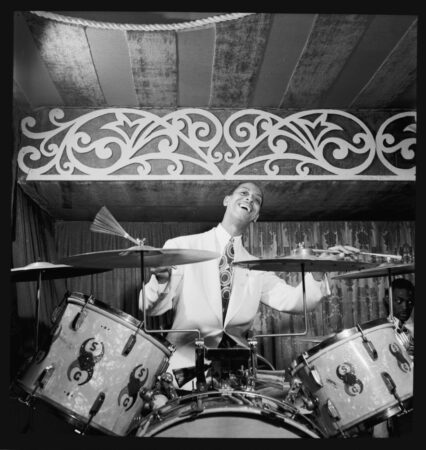On December 13, 1903, William Alexander “Sonny” Greer was born in Long Branch. Considered one of the greatest jazz percussionists in history, he is most famous for being the immortal bandleader Duke Ellington’s drummer for 30 years.

Sonny Greer first studied drums with vaudeville drummer J. Rosemond Johnson. His first professional job was as a youngster in a pit band in Red Bank. Within a few years he was working in the pit orchestra at the Plaza Hotel in Asbury Park.
Mr. Greer was a contemporary of fellow jazz legend William “Count” Basie, of Red Bank. Mr. Basie at one time had aspirations of his own to become a drummer, but changed his mind after hearing Greer, who was so obviously superior on drums that Basie returned his focus to the piano. The men became friends and formed a duo for a time.
In 1918, when he was playing in Fats Waller’s trio in a boardwalk hotel in Asbury Park, Sonny Greer was invited to Washington, D.C., for a weekend. There he joined the pit band at the Howard Theater and remained in it for three years. During this period, he met pianist Edward Kennedy Ellington, better known as “Duke.”
Life as a professional musician in the early 20th Century was anything but easy. Mr. Greer, a skilled billiards player, often had to use his talents as a pool hustler so the band “would have eating and walking-around money,” until Ada Smith, the singer known as Bricktop, helped them get a booking at Barron’s, a Harlem club. During the Barron’s engagement, Duke Ellington became the leader of the group. When the band later moved downtown to the Kentucky Club, Sonny Greer took on an additional duty.
“’We had all kinds of people coming in to the Kentucky club – entertainers, racketeers, socialites, the good and the bad,” Greer recalled of those Prohibition days. “Because I knew so many characters and had a great memory, no one could get a drink in the place unless I gave the nod.” During their engagements at the Kentucky Club, Sonny kept losing drum sets in fires that seemed suspiciously designed by the management for insurance purposes.
With the Ellington orchestra, Sonny Greer formed one of the most powerful rhythm sections of all time with bass player Jimmy Blanton. Every jazz drummer and bass player has at one time or another referenced their beats.
A Singular Talent
While he was never considered to be the greatest timekeeper, Sonny Greer was perfect for Duke Ellington’s Orchestra, adding color and class to the rhythm section. Mr. Ellington, conceding that Greer “’was not the world’s best reader of music,”’ acclaimed him “’the world’s best percussionist reactor.”
Sonny Greer had a large array of sounds beyond the drum kit to generate funky beats. He was one of the first drummers to use other percussion instruments, such as gongs and cymbals and instruments from other cultures; creating the first so-called “jungle music.” He was even known to use timpani heads on his bass drum so the drum could be tuned to a precise pitch.
He was a very elegant and showmanly drummer. He sat slightly above and behind the rest of the Ellington band, enthroned on a stand on which he was surrounded by a glittering array of paraphernalia that included chimes, timpani, innumerable cymbals, tom-toms, snare drums and bass drums and a huge gong set up in back of him as though to form a massive halo.
“Sonny knew what audiences liked,” said Mercer Ellington, Duke’s son. “He was one of the few people from whom Duke readily took advice. A great reactor to material, he needed only a skeleton of an idea. With that as a base, he’d contribute a great deal to the glory of a work. Sonny had a great ear and unusual reflexes.”
“When he heard a ping, he responded with the most apropos pong,” Duke Ellington wrote in his autobiography, “Music Is My Mistress.” “Any tune he was backing up had the benefit of rhythmic ornamentation that was sometimes unbelievable. And he used to look like a high priest or a king on a throne, ‘way up above everybody, with all his gold accessories around him, all there was room for on the stand!”
Whitney Balliett, the jazz critic of The New Yorker, said that Sonny Greer gave the impression “that he was testing his drums.” “He moves ceaselessly back and forth between his cymbals,” Balliett wrote, “sampling their high-pitched centers, drops in sudden experimental offbeats on the cowbell, rustles his high-hat cymbals ominously and then clamps them shut with a whussht, inserts abrupt, crescendo snare drum rolls, sounds jumbo beats on his bass drum or settles into steady lackadaisical afterbeats on the snare rims which suggest Stepin Fetchit in a hurry.”
Sonny Greer was a heavy drinker, and in 1950, Duke Ellington responded to his drinking and occasional unreliability by taking a second drummer, Butch Ballard, with them on a tour of Scandinavia. This enraged Sonny, and the consequent argument led to their permanent estrangement. In 1951, Sonny Greer left the Ellington band along with Lawrence Brown, the trombonist, to play in a band led by Ellington’s star alto saxophonist, Johnny Hodges. Mr. Greer stayed with Hodges for six months and then settled in New York, where he freelanced for the next 30 years at the Stuyvesant Casino, the Metropole, the Embers and many other clubs and with groups led by Red Allen, Tyree Glenn, and J.C. Higginbottham. In 1967 Sonny led his own band, and later played with pianist and singer Brooks Kerr’s trio in the 1970s.
Sonny Greer passed away in 1982 at the age of seventy-nine.
Sources:
Basie, Count. (2000). Good Morning Blues: The Autobiography of Count Basie. Paladin Grafton Books, London, P. 33.
Sonny Greer. Drummerworld. Available: https://www.drummerworld.com/drummers/Sonny_Greer.html
Sonny Greer, Duke Ellington’s Crowd Pleaser. Modern Drummer. Available: https://www.moderndrummer.com/2010/01/sonny-greer/
Wilson, John S. (1982.) Sonny Greer, 78, Ellington Drummer, is Dead. The New York Times, March 25, 1982, Section D, Page 21.
Wolf, William. (1968). 50 Years a Musician. The Asbury Park Press, July 6, 1968, P. 33.
Featured image credit: Sonny Greer by Gordon Parks – This image is available from the United States Library of Congress Prints and Photographs division under the digital ID fsa.8d13215.


Thank you for the information about Sonny Greer I learn a lot he was a terrific drummer.
Thanks, I was a drummer in my youth and I agree, he was amazing. There are some good videos that show him in action, he deserves to be better remembered. – John
We need to hear more about guitar man TAL FARLOW from SEA BRIGHT – NEW JERSEY !